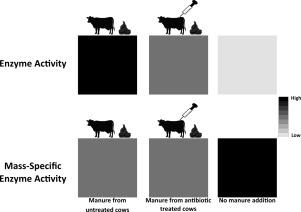当前位置:
X-MOL 学术
›
Appl. Soil Ecol.
›
论文详情
Our official English website, www.x-mol.net, welcomes your feedback! (Note: you will need to create a separate account there.)
Livestock manure and antibiotics alter extracellular enzyme activity
Applied Soil Ecology ( IF 4.8 ) Pub Date : 2020-11-01 , DOI: 10.1016/j.apsoil.2020.103667 Steven G. McBride , Carl Wepking , Matthew L. Hedin , Rebecca C. Thompson , John E. Barrett , Michael S. Strickland
Applied Soil Ecology ( IF 4.8 ) Pub Date : 2020-11-01 , DOI: 10.1016/j.apsoil.2020.103667 Steven G. McBride , Carl Wepking , Matthew L. Hedin , Rebecca C. Thompson , John E. Barrett , Michael S. Strickland

|
Abstract Soil enzyme activities are commonly used for inferring microbial processes and nutrient limitations. In agroecosystems these enzymes can also be used to determine management effects on soil quality. Here we report the effect of dairy manure inputs and veterinary antibiotics (cephapirin and pirlimycin) on soil enzyme activities, using both a nationwide survey and a controlled field experiment. We found that manure from dairy cows increased ɑ-glucosidase (67.5%), β- d -cellubiosidase (51.4%), β-xylosidase (48.5%), and total measured enzyme activity (34.0%). Manure reduced mass-specific enzyme activity of 5 of the 6 measured enzymes and relieved microbial phosphorus limitation, as β-glucosidase:acid phosphatase activity was 34% higher in the manure treatment. Veterinary antibiotics administered to livestock decreased the activity of individual soil enzymes, yet only pirlimycin elicited a significant decrease in activity for β-D-cellubiosidase (48.1%), leucine aminopeptidase (24.1%), β-xylosidase (41.9%), and total measured enzyme activity (18.6%). We found that microbial resource allocation was largely unchanged by antibiotic treatment; however, mass-specific leucine aminopeptidase was marginally higher (21.4%) in the control treatment than in the cephapirin treatment, potentially linking antibiotics to microbial resource allocation strategies. Our results suggest that administering antibiotics to livestock affects gross ecosystem processes - i.e. decomposition rate – through effects on microbial biomass. Furthermore, manure directly impacts microbial resource allocation while antibiotics administered to livestock appears to have a less pronounced impact on microbial resource allocation. Taken together, administration of antibiotics to livestock can affect overall ecosystem process rates but is unlikely to affect microbial resource allocation.
中文翻译:

畜禽粪便和抗生素改变细胞外酶活性
摘要 土壤酶活性通常用于推断微生物过程和养分限制。在农业生态系统中,这些酶还可用于确定管理对土壤质量的影响。在这里,我们使用全国性调查和受控田间试验报告了奶牛粪投入物和兽用抗生素(头孢匹林和吡利霉素)对土壤酶活性的影响。我们发现奶牛粪便增加了 ɑ-葡萄糖苷酶 (67.5%)、β-d-纤维素酶 (51.4%)、β-木糖苷酶 (48.5%) 和总酶活性 (34.0%)。粪便降低了 6 种测量酶中 5 种的质量特异性酶活性,并缓解了微生物磷的限制,因为 β-葡萄糖苷酶:酸性磷酸酶活性在粪便处理中高 34%。给牲畜施用兽用抗生素降低了个别土壤酶的活性,但只有吡利霉素导致 β-D-纤维二糖苷酶 (48.1%)、亮氨酸氨肽酶 (24.1%)、β-木糖苷酶 (41.9%) 和总量的活性显着降低测量的酶活性 (18.6%)。我们发现抗生素治疗后微生物资源分配在很大程度上没有改变;然而,质量特异性亮氨酸氨肽酶在对照治疗中略高于头孢匹林治疗(21.4%),这可能将抗生素与微生物资源分配策略联系起来。我们的结果表明,向牲畜施用抗生素会通过对微生物生物量的影响来影响总体生态系统过程——即分解率。此外,粪便直接影响微生物资源分配,而给牲畜施用抗生素似乎对微生物资源分配的影响不那么明显。总之,对牲畜施用抗生素会影响整体生态系统过程速率,但不太可能影响微生物资源分配。
更新日期:2020-11-01
中文翻译:

畜禽粪便和抗生素改变细胞外酶活性
摘要 土壤酶活性通常用于推断微生物过程和养分限制。在农业生态系统中,这些酶还可用于确定管理对土壤质量的影响。在这里,我们使用全国性调查和受控田间试验报告了奶牛粪投入物和兽用抗生素(头孢匹林和吡利霉素)对土壤酶活性的影响。我们发现奶牛粪便增加了 ɑ-葡萄糖苷酶 (67.5%)、β-d-纤维素酶 (51.4%)、β-木糖苷酶 (48.5%) 和总酶活性 (34.0%)。粪便降低了 6 种测量酶中 5 种的质量特异性酶活性,并缓解了微生物磷的限制,因为 β-葡萄糖苷酶:酸性磷酸酶活性在粪便处理中高 34%。给牲畜施用兽用抗生素降低了个别土壤酶的活性,但只有吡利霉素导致 β-D-纤维二糖苷酶 (48.1%)、亮氨酸氨肽酶 (24.1%)、β-木糖苷酶 (41.9%) 和总量的活性显着降低测量的酶活性 (18.6%)。我们发现抗生素治疗后微生物资源分配在很大程度上没有改变;然而,质量特异性亮氨酸氨肽酶在对照治疗中略高于头孢匹林治疗(21.4%),这可能将抗生素与微生物资源分配策略联系起来。我们的结果表明,向牲畜施用抗生素会通过对微生物生物量的影响来影响总体生态系统过程——即分解率。此外,粪便直接影响微生物资源分配,而给牲畜施用抗生素似乎对微生物资源分配的影响不那么明显。总之,对牲畜施用抗生素会影响整体生态系统过程速率,但不太可能影响微生物资源分配。


























 京公网安备 11010802027423号
京公网安备 11010802027423号